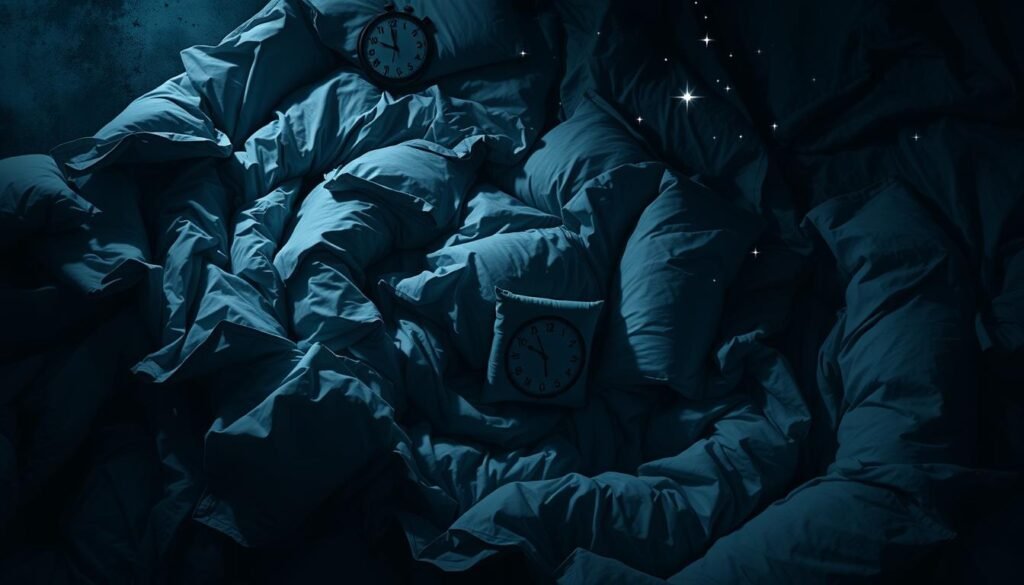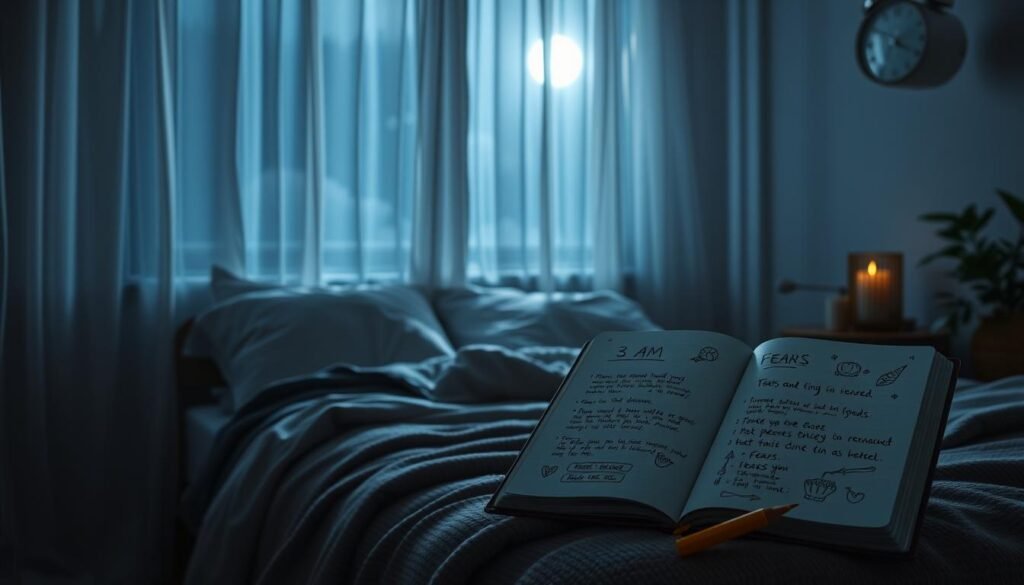Did you know about 35% of adults struggle with insomnia at some time in their life? The journey to beat insomnia can feel lonely and tough. This was true for someone who began to face sleepless nights after starting antibiotics in January 2020. What seemed like a minor side effect quickly turned into a hard fight with insomnia. This led to a lot of stress and worry.
Their journey into the world of sleepless nights began unexpectedly after medication reactions. They looked into many ways to get better sleep and shared insights that might help others in similar situations. They learned not just how hard it is to find peaceful sleep, but also that fearing sleepless nights was a big hurdle.
This story gives us a close look at the struggles you can face when trying to sleep, what can cause them, and how to overcome them to sleep peacefully.
Key Takeaways
- Insomnia impacts many adults, often triggered by various causes.
- Unexpected sleep problems can stem from medication side effects.
- It’s common to feel anxious and hopeless after several sleepless nights.
- Understanding how fear and anxiety play a role is key to handling insomnia.
- Seeking professional help and reflecting on one’s experiences is crucial for healing.
- Exploring different sleep methods and therapies helps in overcoming insomnia.
Introduction to My Insomnia Journey
Patricia Morrisroe began a personal journey with insomnia, entering unknown challenges. She is a fourth-generation insomniac. Her sleep drastically changed due to unexpected events. About 10% of people suffer from chronic insomnia. It deeply affects physical health and emotional well-being.
Once, lack of sleep nearly caused her to have an accident with a cab. That moment showed her the need for better sleep management methods. Over time, she tried many ways to improve her sleep. She saw specialists, bought fancy sleep aids, and joined sleep studies. Yet, finding peace at night remained tough.
Her story teaches valuable lessons to others facing the same problems. It’s important to tackle these sleep challenges early on. Otherwise, they can hurt job performance and increase healthcare expenses. Cognitive Behavioral Therapy for Insomnia (CBT-I) can be a big help. CBT-I, which involves techniques like stimulus control, can change sleep habits and thoughts about sleep for the better.
This story aims to support and uplift others dealing with insomnia. Sharing these experiences encourages a community of understanding and support. It shows we’re not alone in this fight.
The Early Signs of Insomnia
Seeing the early signs of insomnia is key to dealing with it. Often, people don’t connect their trouble sleeping right away to insomnia. Then, one night becomes a clear sign of serious sleep problems. Feeling uneasy when trying to sleep made things worse. This wasn’t just a minor issue but a real battle against anxiety and lack of sleep.
Identifying My Sleep Disruption
At first, I just couldn’t sleep well, tossing and turning all night. This kept happening for weeks, making me feel cranky and tired each day. These early signs showed a big problem that needed fixing, not just small annoyances.
Understanding the Role of Anxiety
Anxiety played a big part in my sleep troubles. It made my sleep issues worse and kept me from relaxing. As I lost more sleep, I worried more about not sleeping. This created a cycle that stopped me from getting good rest. It’s important to see how anxiety and sleep problems are linked to tackle insomnia.
How Antibiotics Triggered My Insomnia Story
Sleep problems often cross paths with various medicines. Using antibiotics, especially for illnesses like C. diff, is a big contributor to insomnia. After taking antibiotics twice in 2018, I saw a big change in how well I could sleep. It was surprising to see how medicines could mess up my sleep.
Exploring Prednisone and Other Medications
Corticosteroids like prednisone also play a role. They’re known as sleep disorder medications. These drugs can change your sleep for the worse. For some, prednisone causes sleep issues by messing up hormone levels and melatonin, making sleep hard to manage.
Recognizing Side Effects Related to Sleep Disorders
Medicines can have unexpected side effects. For example, I had micro-tears in my legs from some treatments. This shows the wide impact of antibiotic side effects. Opioids and ADHD stimulants also make it hard to fall asleep, highlighting the struggle with these side effects.
Sleep issues can come from many medicines. Short-term effects come from antibiotics, but long-term meds can cause lasting sleep problems. It’s important to tackle these issues, knowing it could lead to both short and long-term insomnia. Knowing how medicines affect sleep is key to getting better.
Becoming more aware helps us control our meds and stand up for our health. Understanding sleep disorders, like fatal insomnia, is crucial. This knowledge stresses the importance of being careful with our prescriptions and health overall.Learning about conditions like fatal insomnia provides key insights into the complex world of sleep disorders, emphasizing careful management of medications and health vigilance.
The Spiral into Sleeplessness
Insomnia is a common issue, affecting one in three people at some point. It often starts from stress and anxiety. As life changes, getting good sleep becomes harder. This leads to a tough cycle that’s hard to break.
The Impact of Stress and Anxiety
Stress and anxiety can make you too alert to sleep. Stress makes cortisol levels rise, keeping you awake. When you’re tired, handling stress gets harder. This makes insomnia seem worse, keeping the cycle going.
Cortisol Levels and Their Influence on Sleep
High cortisol can mess up your sleep. This can leave you caught in a cycle where not sleeping makes you more stressed. Over time, this can harm your health, raising the risk of heart disease and diabetes. Learning to manage stress can help lower cortisol and improve sleep.

Seeking Help: The Role of Medical Professionals
Seeking professional guidance is key to managing insomnia effectively. Individuals face various challenges related to medication management when seeking help. Insomnia symptoms and reactions to treatments vary greatly among people.
Challenges with Medication Management
Many factors lead to medication management challenges. These include medicine side effects and difficulties in communicating with healthcare providers. Often, prescribed treatments don’t fully solve insomnia’s root causes, like anxiety or lifestyle issues.
In some instances, medications may not work as expected or can make things worse. Understanding these aspects is essential for anyone dealing with sleep disorders.
Finding Support in Family and Friends
A strong support network is crucial for managing insomnia. Support from family and friends reduces feelings of loneliness and stress. It makes it easier to talk about sleep and encourages better sleep habits.
They help promote consistent sleep schedules and evening relaxation methods.
Cognitive behavioral therapy for insomnia (CBTi) has proven helpful for many. About 70–80% of those who try it see positive changes. It’s often the first step towards overcoming insomnia.
To discover more about sleep hygiene and natural sleep aids, visit this comprehensive guide.
Alternative Therapies for Insomnia Relief
Many people with insomnia find hope and relief in alternative therapies. Different natural sleep aids and mindful practices can combat insomnia without too much medication use. Adding stress reduction techniques to your daily life helps improve sleep and overall health.
Exploring Natural Remedies
Natural sleep aids are becoming more popular for those who avoid prescription drugs. Some common choices include:
- Herbal supplements: Valerian root, chamomile, and lavender can calm the mind and help you sleep.
- Aromatherapy: Using essential oils can make your bedroom a calming space, helping you relax and fall asleep.
- Mindfulness practices: Meditation and deep breathing lower stress, which is key for good sleep.
Adopting Stress Reduction Techniques
It’s important to manage stress to beat insomnia. Adding stress reduction techniques can lead to better sleep. Recommended methods include:
- Yoga: Soft exercises help relax your body and mind, making it easier to sleep.
- Progressive muscle relaxation: Tensing and then relaxing your muscles reduces tension and stress.
- Journaling: Writing your thoughts before bed helps clear your mind, focusing on calming ideas instead.
Using these alternative therapies for insomnia along with good sleep habits can lead to better sleep patterns. Though it might be tough, trying these holistic methods can offer a customized way to fight insomnia.
Understanding Sleep Hygiene Practices
Creating good sleep hygiene can make your sleep better. It involves setting up a sleep-friendly space and routines that help deep, healing sleep. Small changes in daily habits can lead to better sleep.
Creating a Sleep-Friendly Environment
Your sleep quality heavily depends on the environment. A good sleep space needs controlled light, low noise, and a cool temperature. Let’s talk about how to make your bedroom ideal for sleeping:
- Keep the bedroom dark while sleeping; consider blackout curtains or sleep masks.
- Use white noise machines or earplugs to minimize disruptive sounds.
- Maintain a cool room temperature, ideally between 60-67°F (15-19°C).
The Importance of a Consistent Sleep Schedule
Keeping a regular sleep schedule is key for good sleep hygiene. Sleeping and waking up at the same times every day help set your body’s clock. Here’s why a routine is crucial:
| Benefit | Description |
|---|---|
| Improved Sleep Quality | Going to bed and waking at the same time improves sleep quality and lowers disruptions. |
| Reduced Anxiety | A consistent schedule decreases stress about sleeping, helping you relax before bed. |
| Better Daytime Functioning | Sticking to a routine keeps you alert and energetic all day. |
Adding these sleep hygiene tips to your daily life can significantly enhance your sleep. For more help on this topic, check out sleep hygiene resources.
Facing My Fears with Exposure Therapy
Feeling anxious about sleep can be really tough. Exposure therapy for insomnia is a step-by-step way to face these fears. It slowly gets you used to what scares you about sleep. Starting with easier things and working up to the harder ones. It’s important to keep at it. Doing this over and over helps lessen the fear and makes coping easier.

Learning to Manage Anxiety Around Sleep
Dealing with sleep anxiety means knowing what feelings come with not being able to sleep. Therapy looks for what causes these feelings and tracks how you react over time. At first, facing these things might make you more anxious. But as you keep trying, it gets better. You start seeing patterns in your sleep problems and understand them better.
Insights Gained Through Reflection
Thinking about sleep problems shows that you can get past sleep fears. Exposure therapy helps find and deal with the root causes of insomnia, not just the symptoms. Every step towards handling sleep anxiety helps you grow. It leads to knowing more about how and why you sleep the way you do. Learning to face and beat these sleep challenges can really change how you sleep for the better.
Embracing the Power of Cognitive Behavioral Therapy
Cognitive Behavioral Therapy for Insomnia (CBT-I) helps people overcome sleep problems. It changes negative thoughts about sleep to improve it. Kreuza started using CBT-I in 2013 to beat insomnia. These methods helped her find her way back to healthy sleeping habits.
CBT-I as a Solution for Insomniacs
CBT-I usually requires 12 sessions. It uses proven methods for those with chronic insomnia, which affects up to 12% of Americans. Kreuza found these techniques helpful at first. But she struggled with their strictness when facing new problems like fear of sleep. This showed the need for flexible strategies for different sleep issues. Help from a therapist or coach was crucial in using CBT-I well, showing how important guidance is.
Changing Negative Thought Patterns
Kreuza improved her sleep by working on her thoughts and being kind to herself about her sleep problems. This mental shift played a big part in her improvement. The link between sleep and mindsets can change over time. To understand this better, one can check out this journey for more on using CBT-I well.
| Aspect | Details |
|---|---|
| Typical Duration | 12 Sessions |
| Prevalence of Insomnia | 12% of Americans affected |
| Success Rate | 70% when treating insomnia first |
| Registered CBT-I Providers | Approximately 1,000 worldwide |
| Focus | Changing negative thought patterns |
Rebuilding My Sleep Routine
Getting better sleep can make you feel much better all around. By learning about our body’s natural clock, we can choose actions that help us sleep better. The key is to know what your body needs and to act on it.
The Role of Circadian Rhythm and Lifestyle Habits
Knowing how our inner clock works is crucial when fixing our sleep habits. This clock, influenced by things like light, tells us when to sleep and wake up. Sticking to a sleep schedule helps our body adjust. Often, our choices, like using screens at night or drinking caffeine, can mess up our sleep.
Monitoring My Progress Towards Healthier Sleep
Keeping an eye on how well you’re sleeping helps find what works and what doesn’t. Tracking how you feel, your energy, and how long you sleep can show what needs to change. By sticking with it and checking how you’re doing, you’ll take control of getting better sleep. Learning about sleep problems and how to fix adds to this effort.

| Factor | Possible Impact | Recommendations |
|---|---|---|
| Caffeine Intake | Poor Sleep Quality | Limit consumption after noon |
| Screen Time | Delayed Sleep Onset | Avoid screens 1 hour before bed |
| Inconsistent Sleep Schedule | Disrupted Circadian Rhythm | Establish regular sleep and wake times |
| Exposure to Light | Altered Melatonin Production | Utilize blackout curtains in the evening |
| Physical Activity | Improved Sleep Quality | Engage in regular exercise, preferably earlier in the day |
Working on these things consistently can make improving your sleep routine fulfilling. Being patient and dedicated helps enhance sleep quality. This leads to a better life overall.
My Transformation: From Insomnia to Peaceful Sleep
Caitlin’s story shows a big change from sleepless nights to restful sleep. She battled sleep issues for almost ten years, starting at 19. Medications helped a bit at first, giving her around 5 hours of sleep. Yet, when she stopped the meds, her sleep and anxiety problems got worse.
Sharing Insights and Lessons Learned
Caitlin’s shift to better sleep habits was tough but rewarding. She took an 8-week course on Cognitive Behavioral Therapy for Insomnia (CBT-I). It was a game-changer. She learned to tackle her sleep-related fears. She started writing down her worries and doing relaxing activities before bed instead of worrying about sleep.
After the course, Caitlin began sleeping 8 hours nightly. This shift not only bettered her life but also changed how she viewed sleep. She learned to understand that everyone’s sleep needs are different. This helped her stop comparing her sleep habits to others. Her journey taught her the importance of managing sleep and adjusting to her feelings.
The Ongoing Journey of Sleep Management
Caitlin knows that managing her sleep is a continuous process. It’s vital to keep applying what she’s learned and change tactics as necessary. From understanding how her menstrual cycle affects her sleep to keeping a consistent bedtime routine, staying informed is crucial. For anyone struggling with sleep, trying similar methods and a tailored plan can greatly improve sleep quality. Support and information from others can also help on this journey.
You can find more info on how hormonal changes impact sleep here. This can help people tackle their sleep issues better.
Conclusion
The journey through insomnia is hard but it brings inspiring insomnia recovery stories. Charlene had a tough time sleeping after a big loss. She found help not just from doctors but also from changing her sleep habits. These changes show how important it is to get help, whether it’s from doctors or other kinds of therapies.
Dr. Neil Stanley says sleep is very important for our health. Insomnia affects us in many ways, not just our bodies but also our minds and feelings. It can lead to more worry and sadness if not taken care of. Charlene shows us that though many suffer in silence, knowing more and taking steps can make sleep better and help us cope.
On her path to feeling clearer and more rested, Charlene learns something important: insomnia can be managed. By figuring out why it happens—either on its own or because of something else—people can start sleeping better. Every little move towards good sleep habits is a step towards a brighter future.